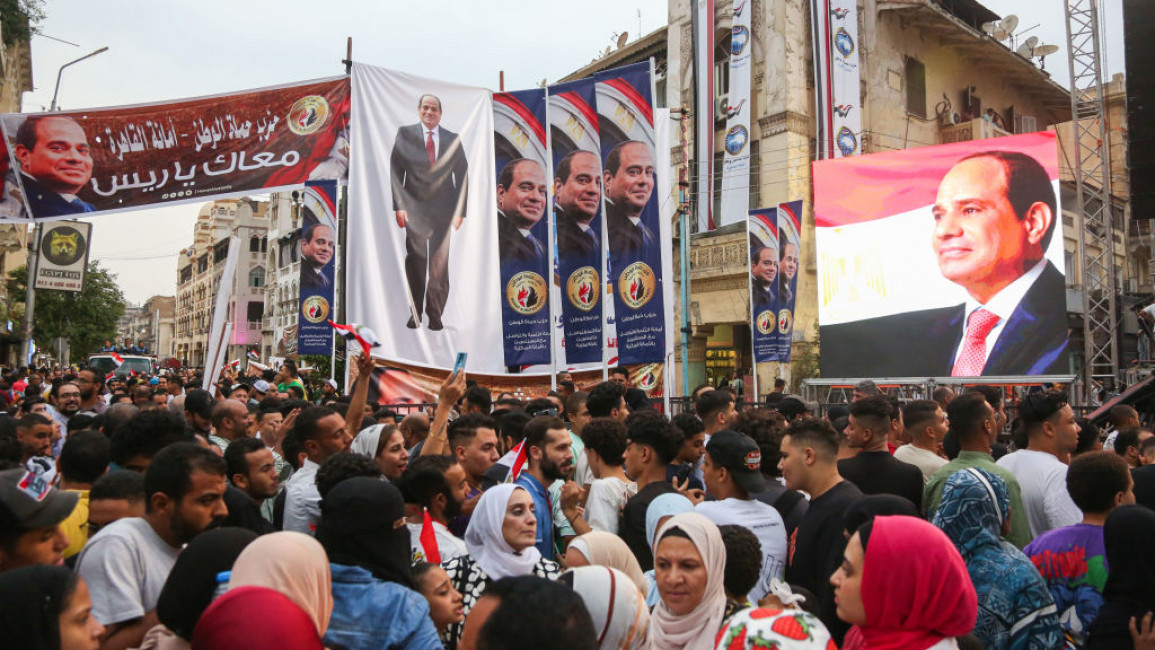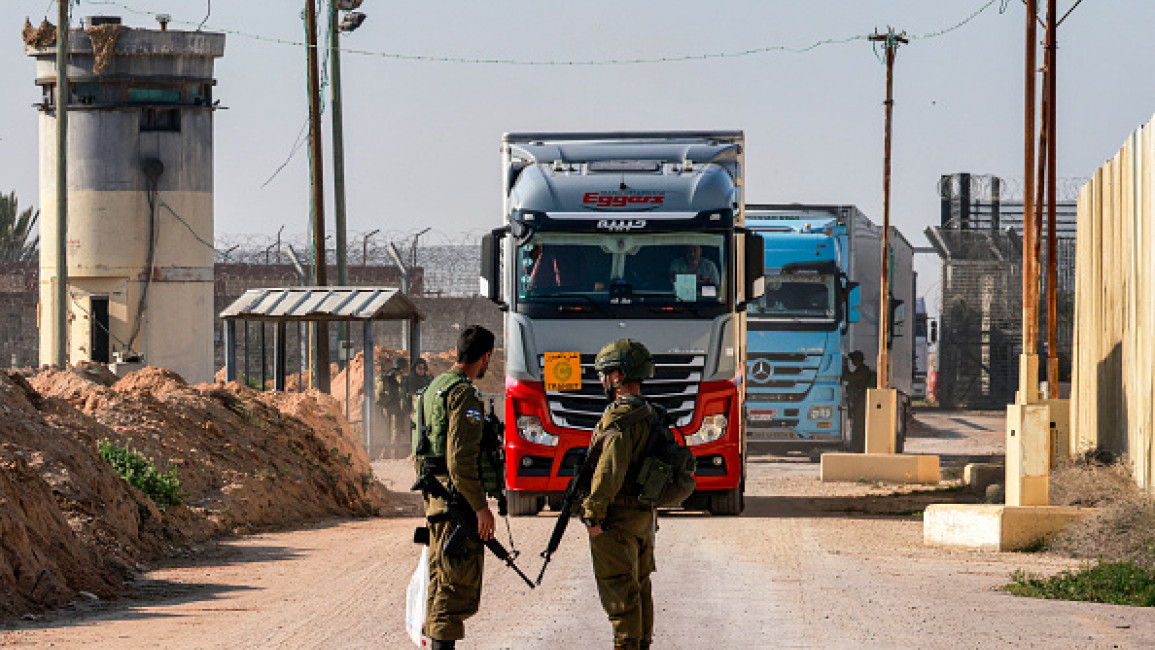
What lies ahead for Egypt after Sisi's re-election?

Following his storming election victory last month, President Abdel Fattah el-Sisi told the nation, "the great Egyptian citizen has stood up to terrorism and violence, endured economic reforms and their impacts”.
Egypt’s leader has unimpeachable power for the next six years, but also ultimate responsibility to steer Egypt’s future as it faces challenges on all fronts with wars in Gaza and Sudan as well as a crippling economic crisis set to worsen in 2024. So, what will President Sisi do next?
“The main concern at the moment is how Sisi can survive as he has difficult problems in the internal dimension and the external dimension is even more complicated due to the risk of spillover from the wars in Gaza, Sudan and now the Red Sea crisis,” Giuseppe Dentice, head of the MENA desk at the Centre for International Studies, told The New Arab.
"What is very clear is that the most urgent or the most pressing topic for Sisi is the debt crisis, and mostly the hard currency shortage"
In the first week of the year, Egypt’s external worries grew following Israel’s drone attack in Beirut and the continuation of Houthi attacks on Red Sea vessels, threatening Egypt’s hard-fought national security and economic recovery.
According to Middle East analyst Matteo Colombo, we can expect Sisi to tread the safest path possible. “Stability and security are the keywords that have characterised Sisi’s presidency since the beginning and even more so now as the situation is quite worrying for Egypt with two crises at its borders.”
Domestically, Sisi’s government kicked off 2024 by issuing a series of steep price hikes for services and utilities as part of the drive to raise state revenue to help repay the $29 billion of external debt repayments due in 2024.
“It seems that the new economic direction is towards austerity,” Maged Mandour, author of 'Egypt Under Sisi'. told The New Arab. “Over the past two days, he's really welcomed the New Year with increases in prices across the board,” he added.
“What is very clear is that the most urgent or the most pressing topic for Sisi is the debt crisis, and mostly the hard currency shortage.”
|
|
Geography problems
President Sisi is in a unique but precarious position regarding the Gaza conflict. He stands to gain power due to Cairo’s potential to act as a mediator, but Egypt is also exposed to the threat of violence and refugees spilling over into Sinai, which could threaten Egyptian sovereignty and compromise Sisi’s pledge to support the Palestinian cause.
“In Gaza, he's really trying to balance between the very clear red line of allowing Israel to ethnically cleanse the strip, because that's a big no-no, that would be domestically catastrophic, but at the same time, Israel is a very close ally,” Mandour said.
The robust rejection of a Palestinian resettlement policy is likely to continue as Sisi prioritises security and Egypt’s sovereignty above all else. But Israel’s plans for Gaza after the crisis still include Egypt playing a role in accepting refugees.
"The main concern at the moment is how Sisi can survive as he has difficult problems in the internal dimension and the external dimension is even more complicated due to the risk of spillover from the wars in Gaza, Sudan, and now the Red Sea crisis"
“The Gaza war and the humanitarian pressure exerted on the borders, of which Rafah is emblematic, will be no exception, and el-Sisi has made it fearlessly and publicly clear that he rejects the relocation of Palestinians to Egyptian territory at the expense of the country’s security,” according to Dr Maria Gloria Polimeno, author of the upcoming book 'Egypt and the rise of fluid authoritarianism'.
About 200 kilometres west of Gaza, Egypt’s Suez Canal, often considered a great geographical blessing, is turning into a curse as cargo ships are choosing the longer route around the Horn of Africa and Suez Canal revenue is shrinking due to the ongoing Houthi attacks.
“If the attacks by the Houthis continue, Egypt will face less revenue from the Suez Canal, which makes up a significant portion of its state revenue,” Colombo said.
Sisi has previously condemned Houthi attacks on Saudi Arabia and has called on Houthi rebels to step down from the civil war for the sake of Yemen. He is widely expected to take an anti-Houthi stance on the Red Sea attacks to protect Egypt.
“The crisis in the Red Sea is critical for Egypt’s security, in terms of the economy, in terms of energy and also in terms of political exposure,” Dentice told TNA.
|
|
Money matters
Early last week, Prime Minister Mostafa Madouly said he expects the nation to recover economically in 2025. But Sisi’s government still isn’t in the clear, as the Central Bank needs to repay $29.5 billion of external debt in 2024 and is unlikely to access international capital markets due to its weak credit profile.
Thanks to Sisi’s close relationship with Western governments and position in the Gaza conflict, Egypt may receive some economic respite in the form of an increased IMF loan and even a possible €9 billion loan from the EU.
“I think he just might try to play Egypt’s geopolitical position to try to get some international support to pay for his policy of massive debt… but the required inflows are massive,” Mandour said. “Giving him 10 billion or 20 billion [dollars] won’t solve this problem.”
Dr Polimeno told TNA: “The economy harbours major structural and financial risks as well as social constraints that remain neglected. The country is still at risk of financial collapse, foreign reserves are drying up, imports exceed exports, and the country is in a severe food crisis due to surging food prices”.
“Despite this, in 2024 Egypt is planning the extension of the New Capital but this risks burdening the country’s debt deficit which in 2024 amounts to 368 billion US dollars.”
"The main issue for him is that if he changes the economic model, he loses a key component of the elite in Egypt and the military are very much part of that"
Megaprojects roll on
Megaprojects like the New Capital have been one of the most defining characteristics of Sisi’s 11-year tenure and the landscape of Egypt has changed due to the dramatic building spree.
President Sisi told his citizens he would “continue building the new republic” in his election speech and is unlikely to change his policy of building despite the economic crisis, Mandour believes.
“He has said openly that he won’t slow down on megaprojects. There will be no fundamental change in policy, especially as this hasn’t happened in the last three years, even though the economic crisis has been deep.”
One reason behind the continuation is Sisi’s need to keep the military on his side. “I think the main issue for him is that if he changes the economic model, he loses a key component of the elite in Egypt and the military are very much part of that,” Colombo said.
“As infrastructure projects and extractive industries are key revenues for the elite, changing the model means they would stop supporting Sisi. But this is also an issue as the discussions with the IMF continue and the IMF are pushing to reduce the public sector of Egypt, which has a strong military component.”
While Sisi’s economic problems mount as the construction carries on, Mandour thinks that the megaprojects will absorb more of the dwindling financial resources. “The most likely trend is that militarised state capitalism will become even more vicious and it will cannibalise more of the public resources.”
Lara Gibson is a Cairo-based journalist closely following Egypt's economic and political developments.
Follow her on Twitter: @lar_gibson



![President Pezeshkian has denounced Israel's attacks on Lebanon [Getty]](/sites/default/files/styles/image_684x385/public/2173482924.jpeg?h=a5f2f23a&itok=q3evVtko)



 Follow the Middle East's top stories in English at The New Arab on Google News
Follow the Middle East's top stories in English at The New Arab on Google News


